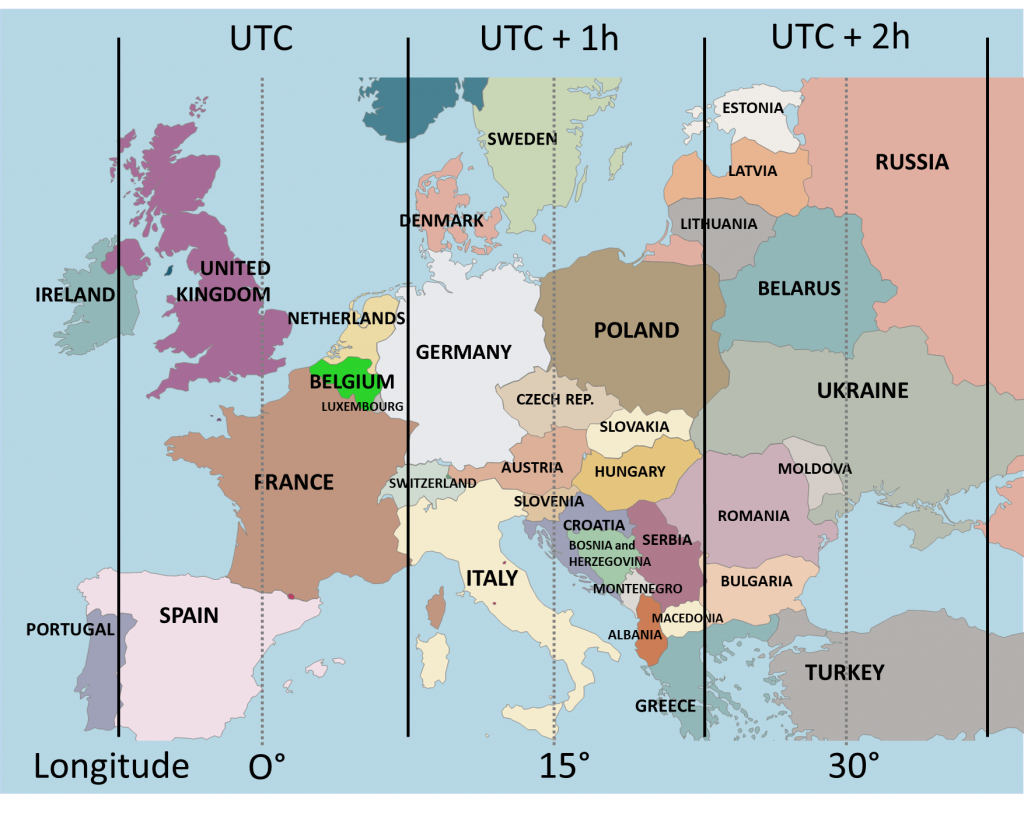Geographically, Belgium extends in longitude from 2.6 to 6.4 degrees east. Following the division in 24 timezones, Belgium is located in the Greenwich timezone.
 Our time is therefore the Greenwich Mean Time (GMT), now Coordinated Universal Time (UTC). The old name GMT (Greenwich Mean Time) is still sometimes used, but it is not quite correct, since until 1925, according to GMT, the day started at noon. On 1 May 1892, the Belgian State adopted GMT (later UTC) as legal time.
Our time is therefore the Greenwich Mean Time (GMT), now Coordinated Universal Time (UTC). The old name GMT (Greenwich Mean Time) is still sometimes used, but it is not quite correct, since until 1925, according to GMT, the day started at noon. On 1 May 1892, the Belgian State adopted GMT (later UTC) as legal time.
The daylight saving time system was first introduced during the First World War in some European countries. In these countries, legal time is advanced by one hour during some periods in the summer (UTC + 0 h in winter and UTC + 1 h in summer for the Belgian time zone at the time). In Belgium, the occupied territories followed the time (and daylight saving time) of Germany while the rest of the territory followed the Greenwich Mean Time (UTC + 0 h).
During the Second World War, all occupied territories, including Belgium, were required to adopt German time (UTC + 1 h, winter time, and UTC + 2 h, summer time). In 1946, summer time was abolished, but Belgium decided to keep German time and an hour was added. The Royal Decrees speak of an “advance” of the legal time (UTC) of 60 minutes (UTC + 1 h). Since then, our country has maintained this shift for winter time.
The daylight saving time system was reintroduced in 1977. Since then, an extra hour has been added in summer. Legal time in Belgium is now UTC + 1 hour in winter and UTC + 2 hours in summer. When it is 13:00 in UTC, it is in fact 14:00 in winter time and 15:00 in summer time.
Since 1996, the changeover from winter to summer time has taken place on the night between Saturday to Sunday during the last weekend of March, and the changeover from summer to winter time on the night between Saturday to Sunday during the last weekend of October.
The table below shows the latest dates for switching from winter to summer time and vice versa.
Complete list of daylight saving time change dates for Belgium.
Daylight saving time changes take place on Sunday mornings at 1.00 UTC. For the changeover to winter time in Belgium (last Sunday in October), at 3.00., local time becomes 2.00. local time. For the changeover to summer time (last Sunday in March), 2.00 local time becomes 3.00 local time.
The changeovers are regulated by Royal Decree by the Minister of Home Affairs in accordance with the directives of the European Parliament and the European Union.
(e.g. for the years 1998-2001, they were published in the Moniteur belge of 19.12.1997, p.34256).
For the period after 2001, the Directive (PDF) of the European Parliament and the Council of 19 January 2001 is followed. This directive is transposed into national
law for Belgium by the Royal Decree of 19 December 2001 (published in the Moniteur belge of 28 December 2001 and 1 February 2002).
This Decree specifies that, as from 2002, the advance on legal time, set at sixty minutes, will be increased to one hundred and twenty minutes on the last Sunday of March, at 1.00 universal time (2.00 local time) and that it will be reduced to sixty minutes on the last Sunday of October, at 1.00 a.m. universal time (3.00 a.m. local time).
As no deadline was specified, the annual changeover from summer to winter time (and vice versa) was established for an indefinite period.
Europe recently decided to end daylight saving time. Belgium and its neighbours have to choose whether they will remain permanently on winter time (UTC+1h) or summer time (UTC+2h). In order to inform about the consequences of either choice, the Time Office of the Royal Observatory of Belgium has compiled a document that presents the astronomical data for Belgium.
